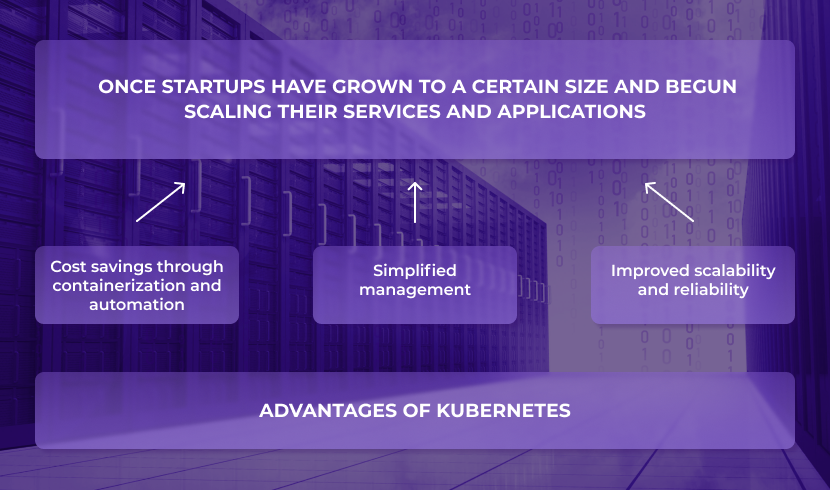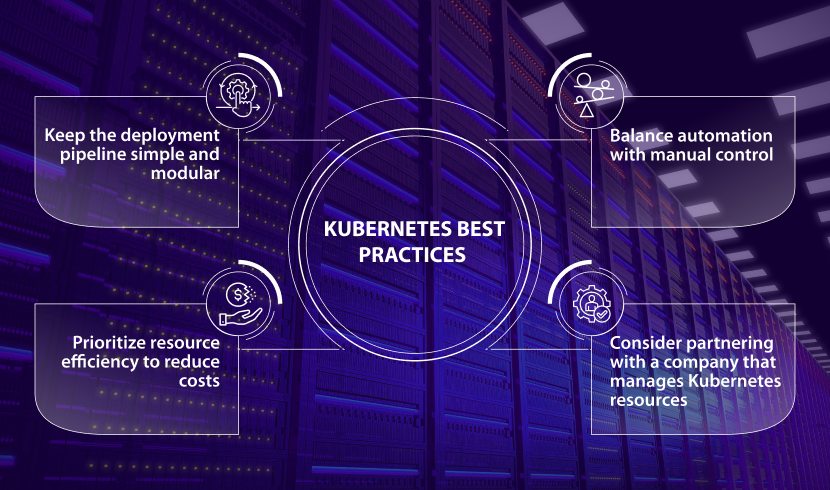As a startup founder, you may have an amazing team and product roadmap, but managing application development and deployment processes can be overwhelming. Fortunately, Kubernetes can help. Co-authored by Sergey Ponomarenko, DevOps Team Leader at PieSoft, this article highlights the benefits of Kubernetes for startups. With his vast experience, Sergey has seen how Kubernetes simplifies development and deployment, reduces costs, and enhances scalability. At its core, Kubernetes is an open-source container orchestration platform that automates the deployment, scaling, and management of containerized applications.
Whether you’re working with microservices or monolithic applications, Kubernetes can help you optimize resource utilization and automate your deployment pipelines. With built-in load balancing and autoscaling capabilities, Kubernetes can also help ensure high availability and reliable performance for your users.
Of course, as with any technology, it has its pros and cons. While it can offer significant benefits to startups, it can also be complex to implement and maintain, especially for smaller teams with limited resources. That’s why it’s important to carefully consider whether Kubernetes is the right solution for your specific needs and goals.

In this article, we’ll explore the advantages and disadvantages of using Kubernetes for smaller teams, and offer guidance on best practices for implementation. We’ll also share some real-world examples and success stories from our own experiences working with startups.
So, whether you’re just starting out or looking to scale your business, read on to learn more about how the technology can help you streamline your development and deployment processes, reduce costs, and improve the reliability and scalability of your applications.
What Is Kubernetes, and How Does It Work?
As mentioned earlier, Kubernetes is an open-source container orchestration platform that automates the deployment, scaling, and management of containerized applications. It was originally developed by Google and is now maintained by the Cloud Native Computing Foundation (CNCF). Kubernetes allows you to run containerized applications on a cluster of computers and automatically manages the distribution and utilization of computing resources.
At a high level, it works by managing a cluster of nodes, where each node represents a physical or virtual machine. Containers are then deployed to these nodes as pods, which are groups of one or more containers that share the same network namespace and storage volume. Kubernetes then schedules and manages these pods, ensuring that they are running and healthy, and automatically adjusts resource allocation as needed.
Advantages of Using Kubernetes for Startups
As a startup founder, you understand the importance of finding cost-effective solutions that can help you scale your business. Kubernetes can offer just that—a way to reduce costs through containerization and automation. Containerization allows you to pack your applications and services into lightweight, portable containers that can be easily moved between environments. This means you can run more applications on fewer servers, reducing infrastructure costs, and increasing resource utilization.
In addition to cost savings, Kubernetes can also improve the scalability and reliability of your applications. With its automatic scaling capabilities, it can ensure that your applications can handle surges in traffic without downtime. This is especially crucial for startups that experience rapid growth and need to quickly adapt to the increased demand.

Kubernetes can also simplify the management of distributed applications, especially those that run on a microservices architecture. Instead of having to manage each service individually, it provides a single, centralized platform for managing multiple containers and services. This can reduce the complexity of managing distributed applications, making it easier for small teams to maintain and scale their services without having to spend hours on manual effort.
Overall, Kubernetes offers startups an excellent solution for managing and scaling their applications. With its cost savings, improved scalability and reliability, and simplified management of distributed applications, Kubernetes can be a game-changer for your business.
It’s important to note that while Kubernetes offers numerous advantages for startups, some of these benefits may not apply to smaller startups. For example, the cost savings achieved through containerization and automation may only become significant once a startup has grown to a certain size and the volume of containerized applications justifies the infrastructure costs. Similarly, while Kubernetes can simplify the management of distributed applications, this benefit may only become significant once the startup has started scaling its services and applications, and managing them individually becomes cumbersome.
So, if you’re a smaller startup, alternative solutions may be more appropriate, such as manual deployment or a simpler container orchestration platform. It’s essential to consider whether Kubernetes is the right solution for your particular stage of growth. While Kubernetes can offer many benefits, it’s important to ensure that the costs and benefits are aligned with your current needs.
Disadvantages of Using Kubernetes for Startups
While Kubernetes offers many advantages, there are also some potential drawbacks to consider, especially for smaller startups:
- Complex implementation and maintenance: Kubernetes can be complex to implement and maintain, particularly for smaller teams with limited resources. It requires significant knowledge and expertise in containerization, distributed systems, and networking.
- Potential performance issues: If not properly configured, Kubernetes can introduce performance issues and latency, which can negatively impact user experience and revenue.
- High learning curve for new team members: Because Kubernetes is a complex system, new team members may require significant training and onboarding to become productive.
Therefore, smaller startups should carefully consider their team’s expertise and resources before deciding to adopt Kubernetes. Alternative solutions that are easier to implement and maintain, such as manual deployment or simpler container orchestration platforms, may be more appropriate for smaller startups. However, as a startup grows and its requirements become more complex, Kubernetes can become a valuable tool for managing and scaling its applications.
Best Practices for Smaller Startups
Here are some best practices for implementing Kubernetes for smaller startups:

- Keep the deployment pipeline simple and modular: Focus on creating a streamlined and modular deployment pipeline that is easy to maintain and update. This will help ensure that your team can quickly and efficiently deploy new features and updates.
- Prioritize resource efficiency to reduce costs: Use Kubernetes to optimize resource utilization and minimize wasted computing resources. This can help you reduce your infrastructure costs and ensure that you’re only paying for what you actually need.
- Balance automation with manual control: While Kubernetes automation can save time and effort, it’s important to balance automation with manual control to ensure the system is running as intended. Make sure you have a process in place for monitoring and troubleshooting the system, and don’t rely solely on automation to handle all of the work.
- Consider partnering with a company that manages Kubernetes resources: If you don’t have the knowledge or resources to implement and maintain Kubernetes on your own, consider partnering with a company that specializes in managing Kubernetes resources for other startups. This can help you benefit from the advantages of Kubernetes without having to bear the full cost or complexity of implementation and maintenance.
By following these best practices, smaller startups can successfully implement Kubernetes and enjoy the scalability, reliability, and cost-efficiency benefits it offers.
Conclusion
Kubernetes can be a game-changer for startups looking to streamline their development and deployment processes, reduce costs, and improve the reliability and scalability of their applications. However, smaller startups should carefully consider their resources and needs before deciding to adopt it. As startups grow and their requirements become more complex, Kubernetes can become a valuable tool for managing and scaling their applications.
As a leading provider of software development services, PieSoft has extensive experience with Kubernetes and can offer expert guidance on its implementation and management. With a proven track record of delivering innovative solutions to clients of all sizes, our team is well-positioned to help startups navigate the complexities of Kubernetes and leverage its benefits to accelerate their growth. Contact PieSoft today to learn more about how Kubernetes can benefit your business.


